Bobulate
Home [ade] cookies
What a difference fontconfig makes
August 20th, 2009
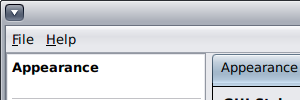 Time for a collection of screenshots, as an illustration of Qt applications on OpenSolaris, both on a local display driven by a Radeon X1200 and on a Sun Ray thin client. Not from KDE applications (although we have KDE 4.3.0 packages for OpenSolaris now) but from qtconfig — possibly the first Qt app you will want to run in OpenSolaris to set up some of the fonts correctly. Before running this version of qtconfig, I removed ~/.config — the whole directory tree — so I would get the default settings. There are screenies of the same 300×100 section of the application on four setups: local display or Sun Ray thin client, and system fontconfig or one built from our own packages. I switched my set of package builds to use the system’s fontconfig a while back, but the specfile for fontconfig (useful if you care about Solaris10) is still there. Both are version 2.5.0; for freetype system is 2.3.7 and the specfiles build 2.3.6.
Time for a collection of screenshots, as an illustration of Qt applications on OpenSolaris, both on a local display driven by a Radeon X1200 and on a Sun Ray thin client. Not from KDE applications (although we have KDE 4.3.0 packages for OpenSolaris now) but from qtconfig — possibly the first Qt app you will want to run in OpenSolaris to set up some of the fonts correctly. Before running this version of qtconfig, I removed ~/.config — the whole directory tree — so I would get the default settings. There are screenies of the same 300×100 section of the application on four setups: local display or Sun Ray thin client, and system fontconfig or one built from our own packages. I switched my set of package builds to use the system’s fontconfig a while back, but the specfile for fontconfig (useful if you care about Solaris10) is still there. Both are version 2.5.0; for freetype system is 2.3.7 and the specfiles build 2.3.6.
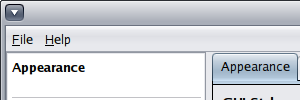 So you would expect very little difference between the two, possibly only a difference in the default fonts. You could use some kind of png diff tool to see the differences, but it’s not a whole heck of a lot.
So you would expect very little difference between the two, possibly only a difference in the default fonts. You could use some kind of png diff tool to see the differences, but it’s not a whole heck of a lot.
A bigger change happens when you switch from a local display (even a lousy onboard X1200) to a Sun Ray thin client display. I know I’ve ragged on parts of Qt in the past and the way KDE deals with less-capable displays, so this time I’m not going anywhere near graphics views.
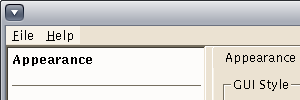 What strikes me immediately is that the style has changed, from one display to another; it now looks a good deal more Morif like. Eww! So what is Qt looking at here to change style like that? (That’s a lazyweb question).
What strikes me immediately is that the style has changed, from one display to another; it now looks a good deal more Morif like. Eww! So what is Qt looking at here to change style like that? (That’s a lazyweb question).
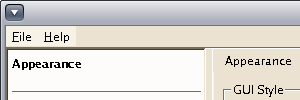 And switching fontconfigs doesn’t do much again. I’m actually curious if either of the fontconfigs does anti-aliasing right now.
And switching fontconfigs doesn’t do much again. I’m actually curious if either of the fontconfigs does anti-aliasing right now.
One thing you can’t see in the screenie is the window titlebar. Whatever the default GNOME window manager is — metacity? — produces really ugly title bars on a Sun Ray, as it looks like the AA falls over, producing hard-to-read letters with white-ish strips between them. Those are screenies for another day.
A Link Potpourri
August 17th, 2009
[ This is a brain dump of a bunch of topics collected over the weekend; I also saw a performance of Purcell’s Dido and Aeneas, so that’s why it’s a potpourri and not something more structured. Call me back when I’ve had more coffee, later in the week. ]
From a research perspective: wow! a verified microkernel. I left my formal verification stuff behind at the university (which reminds me I still have a desk to partly clean out and an HP9000 to trash), but the idea of verifying a Haskell program isn’t all that terrifying; getting the Haskell-C mapping and the machine model mapping right and validated is something to lose sleep over, though. Something to occupy a bunch of grad students for a long long time. So hats off to the UNSW for getting it done and also for writing a wonderfully concise and witty FAQ.
There’s a little bit on tax money going to waste, this time around a CMS for Birmingham; given the importance of the specification for l4v (above) one would think that the specs for a CMS would be somewhat hammered out by now — certainly as far as character encodings go. I’m not sure I agree with the middle of the article, though, where it goes (in hindsight): well, we could have just used WordPress, right? Much as I like WordPress (it runs the FSFE blogs, and although it isn’t entirely compatible with Konqueror 4.2.2, it does well enough) I don’t think it’s the solution to every CMS problem. There could well be additional hidden requirements that the article glosses over and that would have mandated a custom solution.
Still, it’s government money, and I do believe that a custom solution funded by government should be Free Software afterwards, as it represents an investment by society as a whole to improve its infrastructure.
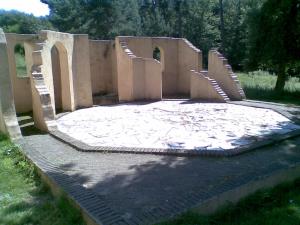 On Free Software topics, I ran across Why Code For Free? on LinuxPlanet; I’m actually none too happy about that article. It has a lot of woolly thinking in it. It’s 2009, come on, couldn’t we at least get a characterization of the four freedoms that the GPL aims to protect that is both concise and gripping? Let’s not forget, rhetoric (the modern trend of invading, tracking, and trying to control personal use) aside, that freedom 0 is only very very rarely touched upon by any license [mental exercise: if software is delivered without warranty or claim of fitness for a particular purpose, can you add restrictions stating that it is unfit for some purpose or may not be used for some purpose?]. In retrospect, I suppose that the end of the introduction (non-coder, us lowly end users) should have tipped me off that this is hardly a piece to take seriously.
On Free Software topics, I ran across Why Code For Free? on LinuxPlanet; I’m actually none too happy about that article. It has a lot of woolly thinking in it. It’s 2009, come on, couldn’t we at least get a characterization of the four freedoms that the GPL aims to protect that is both concise and gripping? Let’s not forget, rhetoric (the modern trend of invading, tracking, and trying to control personal use) aside, that freedom 0 is only very very rarely touched upon by any license [mental exercise: if software is delivered without warranty or claim of fitness for a particular purpose, can you add restrictions stating that it is unfit for some purpose or may not be used for some purpose?]. In retrospect, I suppose that the end of the introduction (non-coder, us lowly end users) should have tipped me off that this is hardly a piece to take seriously.
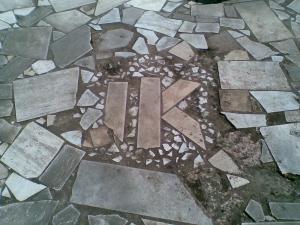 David Jarvie is the KDE “date and time dude”. Give him a good long scarf and I’m sure he could figure in Dr. Who. My hat off to anyone who deals with timezones and calendar systems on a daily basis. While tooling around on the topic, I found some interesting definitions of the epoch (an arbitrary moment to start counting time from), a leap back and a more recent reintroduction of the leap back. This time related to standardization and arbitrary kludges in calendars (man -s 1 cal ; cal 9 1752). David, next Akademy you get more beer.
David Jarvie is the KDE “date and time dude”. Give him a good long scarf and I’m sure he could figure in Dr. Who. My hat off to anyone who deals with timezones and calendar systems on a daily basis. While tooling around on the topic, I found some interesting definitions of the epoch (an arbitrary moment to start counting time from), a leap back and a more recent reintroduction of the leap back. This time related to standardization and arbitrary kludges in calendars (man -s 1 cal ; cal 9 1752). David, next Akademy you get more beer.
Lastly, I recently took a look at a reconstructed 4th century baptisterium, where I found the K-logo in the mosaic in the floor. So I think that expands the range of dates KOrganizer — and KDateTime — should support easily by a great deal. After all, St. Augustine had appointments too.
Tornado
August 13th, 2009
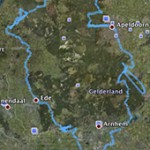 Back from a two-week cycling vacation, just the family, three bikes and a tent. Mira is now six, so she can ride her own bike for about 10km on regular roads before she’s tired. To cover the rest of the distance we got a bike trailer thing that her bike hooks into — it lifts the front wheel securely off the ground, leaving the rear wheel on the road where it can be pedaled as usual, or freewheeled. Still, with the time constraints of packing up, cyling slowly for an hour and kids falling asleep at the wheel (or handlebars), we covered 20-40km per day. Our campgrounds are either farms (SVR) or nature campgrounds; the Netherlands is a good location for family cycle tours, because there’s plenty of camgrounds and nearly always a supermarket every 10km or so. That means lots of contingencies can be handled, including “heavy rain: go play in shopping carts”.
Back from a two-week cycling vacation, just the family, three bikes and a tent. Mira is now six, so she can ride her own bike for about 10km on regular roads before she’s tired. To cover the rest of the distance we got a bike trailer thing that her bike hooks into — it lifts the front wheel securely off the ground, leaving the rear wheel on the road where it can be pedaled as usual, or freewheeled. Still, with the time constraints of packing up, cyling slowly for an hour and kids falling asleep at the wheel (or handlebars), we covered 20-40km per day. Our campgrounds are either farms (SVR) or nature campgrounds; the Netherlands is a good location for family cycle tours, because there’s plenty of camgrounds and nearly always a supermarket every 10km or so. That means lots of contingencies can be handled, including “heavy rain: go play in shopping carts”.
The image is from Google Earth; the data is my GPS track from my Amaryllo logger, which is 27MB — not bad for 5 days of logging, really (we didn’t relocate daily). There’s some gaps in the data, mostly where reception was poor due to heavy rain and tree cover, but on the whole it gives a good idea of where I’ve been, and is nice for supporting my memory of what we did.
Getting back into the swing of things — work, and I totally missed the release of KDE 4.3 and the demise of SXCE — will be the rest-of-the-week activities.
EU Microsoft Browser Selection Remedy
July 28th, 2009
As noted elsewhere (for instance Ars Technica or OsNews or the EU itself) the European Commission has reached a conclusion with Microsoft about Internet browser choice for consumers. The proposed remedy is a browser ballot, from which users of new (and possibly also old) installations of the Windows operating system will be able to select a browser to use.
The devil is, of course, in the details, and the Free Software Foundation Europe is on the case. The (well, one) thing to watch out for is freezing the browser market in much the same way that it is now; that is, suppose the browser ballot says “Arora, Firefox, IE, Opera” then we have replaced a monopoly by an oligarchy and continue to frustrate innovation and choice on the desktop. So details include questions like “how do we determine which browsers are on the ballot at any given time?” That ties in to the dynamic nature of the browser market (well, that part outside of the monopoly) where new versions are released regularly and there’s a whole forest of Free Software alternatives to the “Big Three” (IE, FF, SafOpera). Designing a ballot that prevents leveraging the existing monopoly position is another issue — of the big three browsers, only one has the word “Internet” in the name, which may skew the ballot.
So the coming months have an interesting mix of social and technical work upcoming in order to provide a remedy that is, in fact, a remedy and not a placebo. The FSFE will continue to follow the case and press for Freedom in browser selection, and supports fair access, competition and innovation in the browser market.
Open.* conferences
July 28th, 2009
Time for my semi-regular Open.* conference reminders; Free Software conferences, Open content, what have you, all kinds of neat stuff that you might still be thinking about attending or sending papers to. Open Rhein Ruhr is the farthest away in time, so lots of opportunity there to still get in a talk. I unfortunately can only submit an English language talk on software licensing, although my German is getting better (only on topics like Vereinsrecht, though). OpenExpo is closest, and looks like a good event where I could wear too many hats at once, if I were to attend (I hope I can figure out a way to do so).
In the middle are two overlapping conferences: the NLUUG Fall Conference on the Open Web on October 29th, and the co-located Linux Kongress and OpenSolaris DevCon. I may end up taking the night train from Ede to Dresden to attend the last day of the latter, because I have to be at the former.
[[ Ooh! And there’s EuroBSDCon as well! ]]
People who are not me
July 28th, 2009
I see that Bertjan had the scoop (over the dot story) that the Gran Canaria Desktop Summit videos are online in a Free-Software-friendly format (ogv). Please note that the talk listed as Mustapha Abubakar is not, in fact, Mustapha himself, but some shoddy stand-in who didn’t even bring his Hausa man’s hat. I’m going to have to show the wife this one, because she’s always wondering what it is I actually get up to at these conferences.
Also, Albert has an excellent idea with KDE 4.3 release dinners; that one is past already (vids guys?), but KDE 4.3 is still upcoming.
There’s a KDE-NL Summer BBQ to celebrate the midpoint between KDE 4.3.0 and KDE 4.3.1 on August 23rd, too. Lots of opportunity to demonstrate your secret talents this summer.
FTF news
July 22nd, 2009
The Freedom Task Force is a project of the Free Software Foundation Europe that:
… help[s] people understand Free Software licensing and the opportunities it presents. The FTF offers educational services, facilitates infrastructure activities and manages FSFE’s legal affairs. Its work focuses on the promotion of the proper use of Free Software.
“Proper” use here refers to license compliance; Free Software is, after all, free to use for any purpose. I’ve created a new category in my own blog to file FTF-specific entries (as opposed to, say, KDE-Solaris specific, or just bla-bla). Still, blog entries in that category shouldn’t be considered official pronouncements of the project — there are other avenues for that.
It strikes me as a little odd that the things I do all day are harder to write about than an hour of mucking about that I do late at night. I have something about Qt font rendering on Solaris lined up, and a bit on getting SRSS on OpenSolaris (summary: read the manual) and then I can finally post screenies related to SRSS work done at GCDS — but that is definitely hobby. Daily things are maintaining the FTF website (where I still have to get used to the workflow), list maintainence, and I’m reading a lot of documentation left to me by Shane Coughlan, the previous FTF-coordinator. It’s hard to do a daily item on that kind of work, because it does happen largely in the background. The legal work that the FTF does has a fairly long incubation time. Once it’s done, then you can see, for instance our GPL violations reporting guide (even if it’s short, it takes time to work these things out). Unlike a Free Software project, the process is largely invisible.
Transparency is an interesting beast. At GCDS I spoke with some who would put every person’s medical history (in some open format) in a publicly accessible place; I spoke to others with a strong security and privacy background who would find that a tremendously bad idea. Openness can be used well, or abused — Glyn Moody has a pointer to an interesting project building on the open data provided by a government. There are actually interesting legal topics around combining public domain data and freely-licensed content; this is similar to the old difference between the BSD license family (where widespread use is the most important) and the GPL license family (where maintaining freedom is primary), and something I hope the FTF can look at in future. My point? There’s a huge range of opinions on what constitutes healthy transparency, and I can live with both a terribly open project and one where the process is hidden and the results open. So forgive me if FTF news is infrequent — there’s enough going on.
Flashing, futzing and finishing
July 19th, 2009
Flashing: I spent an intensely annoying morning flashing firmwares and BIOSes. I had purchased an MSI GX620 — a “gamer” laptop, but pretty nice from a developer point of view, too — and noticed that the keyboard would “stick” every now and then, repeating the last key typed ad inifinitum. Power button and trackpad would also cease responding. Either pull the battery and AC — hard power off — or plug in a USB keyboard and mouse and go for a regular shutdown, but then the machine would hang with power and fans still going after the OS says its final goodbyes. It is both reassuring and frightening that “MSI GX620 keyboard problem” turns up plenty of resources about exactly this. And a suggested solution is to flash the firmware and then the BIOS.
Easier said than done, of course, from a dual-boot nonGNU/Solaris and GNU/Linux machine. Heck, even with the Vista that was on the machine when it shipped I’m not sure you can flash. The MSI instructions all assume a DOS environment. I tried the boot disks you can create with Windows XP (which boots to “Windows Millennium”?) but no dice, abnormal program termination. I went looking in my box-of-crap in the attic and found my 3-disk set of MS-DOS 6.2 install floppies, but those no longer seem to work. Heck, it’s a wonder I even have a floppy drive to boot from — I collected a few USB floppy drives a few years back.
This kind of situation makes me long for my usual ASUS motherboards which support flashing from the BIOS itself, and can read CDs.
In any case, I needed to be able to boot an OS I don’t actually have in order to update the machine. Fortunately Daniel documented USB boot disks here, and that finally gave me enough to craft my own simple 10-step procedure: 1. boot ancient windows XP laptop strill used by the kids for Sesame Street games 2. install HP USB disk tool 3. boot modern Linux machine 3a. find USB floppy drive 4. download FreeDOS “ODIN” image 5. try to write the image to a floppy disk 6. download a smaller image, until you get one that fits before the first bad sector on the floppy (for me, fortunately, that was the 720k image) 7. move floppy to windows machine 8. format USB stick with HP tool, using system files from ODIN 9. boot defective laptop from USB stick 10. revel in C:\>
I suppose I could have gone via VirtualBox on Solaris or qemu, but I had neither installed already, and frustration seems to rapidly erode my capacity for lucid thought. In any case, I’ve now gone the day without the keyboard locking up, so the flash updates seem to have helped.
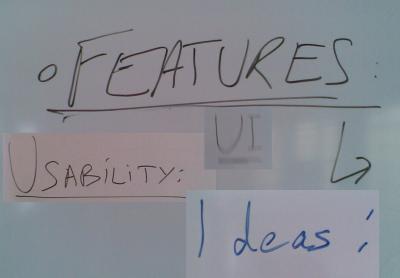 Photos: At Akademy I always try to have some plan on capturing the spirit of the event. In past years I’ve intended to do voice recordings and always forgotten, so this time I did something much more low key: just take pictures of some whiteboards left behind in the conference rooms. This little collage of strings found on boards does seem to capture the working week, though. What are we doing? Even though we’re die-hard computer technologists, we still end up smearing ink on light-coloured surfaces.
Photos: At Akademy I always try to have some plan on capturing the spirit of the event. In past years I’ve intended to do voice recordings and always forgotten, so this time I did something much more low key: just take pictures of some whiteboards left behind in the conference rooms. This little collage of strings found on boards does seem to capture the working week, though. What are we doing? Even though we’re die-hard computer technologists, we still end up smearing ink on light-coloured surfaces.
[[ You’d be surprised, incidentally, about how many of the photos in my phone are of whiteboards at the end of meetings. Best way to remember things. ]]
Finishing: Congratulations, Gökmen and Görkcem on Pardus 2009. It looks very nice. And I really appreciate a distro that comes with TeX.
KDE 4.3 is also looming terrifyingly close, which means that there’s a fistful of OpenSolaris patches we haven’t gotten around to pushing upstream yet. Some are really peculiar, and I appreciate it when people ask me about things like bool() casts — there was one bug report about operator ?: with a bool and a QBool, which seems very peculiar to me. Interesting how QBool doesn’t have an operator bool(), only an operator void *() — I think SS12 is being extra picky here.
Finally, one of the anonsvn mirrors was down again for a bit; this was due to r.997199 which has a badly-encoded log message. Since we have a wild mix of Subversion 1.4, 1.5 and 1.6 infrastructure — and also users with clients of differing versions as well — we do not get a “clean” history. In this case, subversion 1.6 is more picky about the encoding of log messages than older versions. Since I was running 1.6 on the EBN mirror, it refused to synchronize that particular commit and went down. I have since downgraded to 1.5.2 and the mirror has resumed operation, but it’s an illustration that our source history is “interesting” to say the least and the conversion to any other SCM will once again be rife with manual labour to get it all right.
Working Week
July 17th, 2009
Today closes out my first week of working “for” the Free Software Foundation Europe; the word “for” is in quotes because there is still some formalization left to do. Still, the FSFE — and more particularly the Freedom Task Force — is what occupies my time during the week. In terms of response times, that means I’m on call for FTF things during working hours in western Europe. “FTF things” includes planning and executing educational services around Free Software licensing, facilitating infrastructure activities and managing FSFE’s legal affairs; as a whole this is aimed at the promotion of proper use of Free Software.
At the same time, this has an effect on the other Free Software work that I do. My day job is the FSFE, and KDE issues (primarily the OpenSolaris porting work) are going to move more strongly to the evening hours, something like 9-11pm. So do not necessarily expect responses to KDE things, especially bug reports or requests for testing, during the day or while I’m traveling on business. It’s just so easy to get distracted by, say, fiddling around with Qt creator. KDE legal affairs may be compatible with business hours, depending on the topic. What I really need is a green, a purple and a blue hat to indicate what thing I’m working on at any given moment. Maybe I should file a feature request for KMail, disallowing access to certain mail folders during the work day; that would help enforce discipline for me quite a bit.
This first working week was mostly filled with the IFOSSLR launch in London; the journal is independent, but the FTF is keenly interested in high-quality legal opinion on topics around Free Software. I think this is the beginning of a beautiful friendship.
The IFOSSLR
July 16th, 2009
The new legal journal IFOSSLR was launched officially yesterday; see also Carlo Piana’s description. For a legal journal, I think we can claim a real success already, with many thousands of downloads. The topics covered include procurement, risk, the Jacobsen case and random comments by myself around Free Software branding. At the launch event, kindly hosted by Berwin Leighton Paisner, I ran into Glyn Moody (a bit on open access journals, too) and Karen Sandler (from the SFLC). It was just like being back on the Canary islands, almost.
I also discovered that after ten hours of exposure to lawyers, I pass out. Sorry about that, Malcolm.